Samsung SSD 850 EVO (120GB, 250GB, 500GB & 1TB) Review
by Kristian Vättö on December 8, 2014 10:00 AM ESTRandom Read/Write Speed
The four corners of SSD performance are as follows: random read, random write, sequential read and sequential write speed. Random accesses are generally small in size, while sequential accesses tend to be larger and thus we have the four Iometer tests we use in all of our reviews.
Our first test writes 4KB in a completely random pattern over an 8GB space of the drive to simulate the sort of random access that you'd see on an OS drive (even this is more stressful than a normal desktop user would see). We perform three concurrent IOs and run the test for 3 minutes. The results reported are in average MB/s over the entire time.
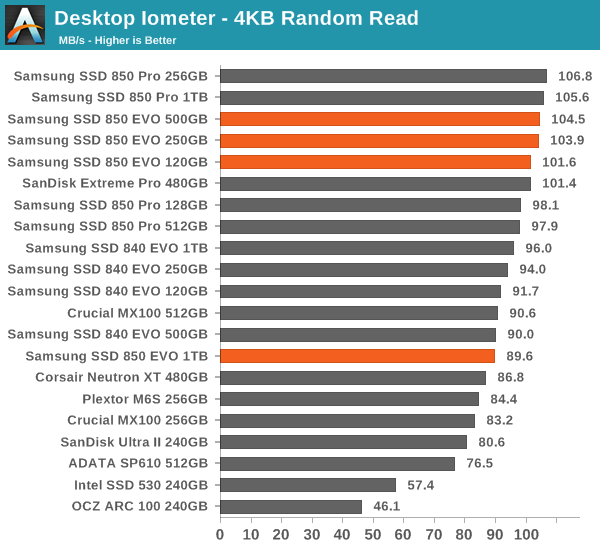
The models with the new MGX controller enjoy excellent random read performance, although the 1TB version isn't bad either. Without knowing the specifications of the MGX controller, it's hard to know what is causing the performance increase, but I still suspect it is due to a higher clock speed.
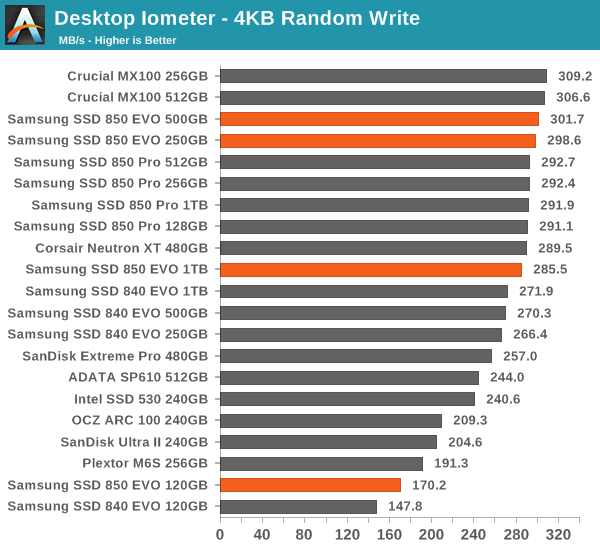
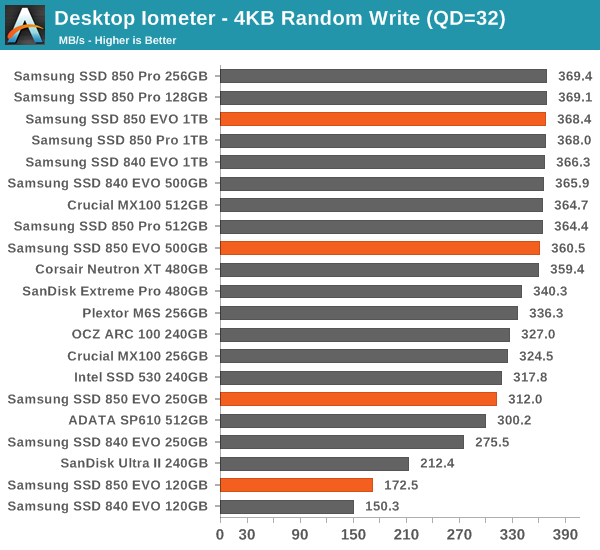
Random write performance also sees an increase across all capacities and is more or less on par with the 850 Pro at larger capacities.
Sequential Read/Write Speed
To measure sequential performance we run a 1 minute long 128KB sequential test over the entire span of the drive at a queue depth of 1. The results reported are in average MB/s over the entire test length.
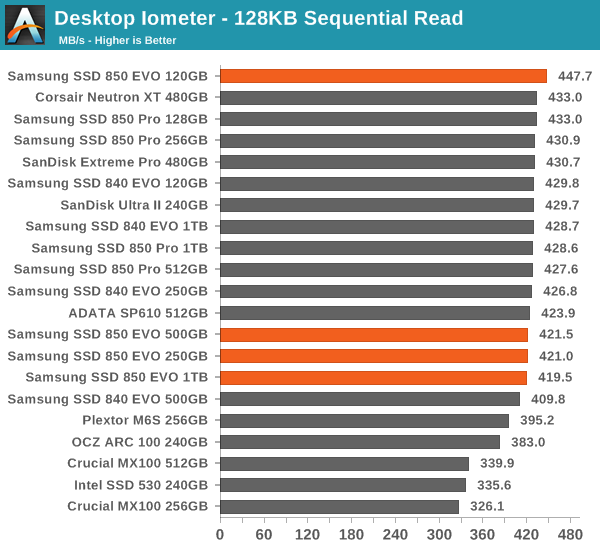
Sequential performance doesn't present any real surprises. Write speed at smaller capacities gets a small boost, but other than that the performance is typical SATA 6Gbps level.
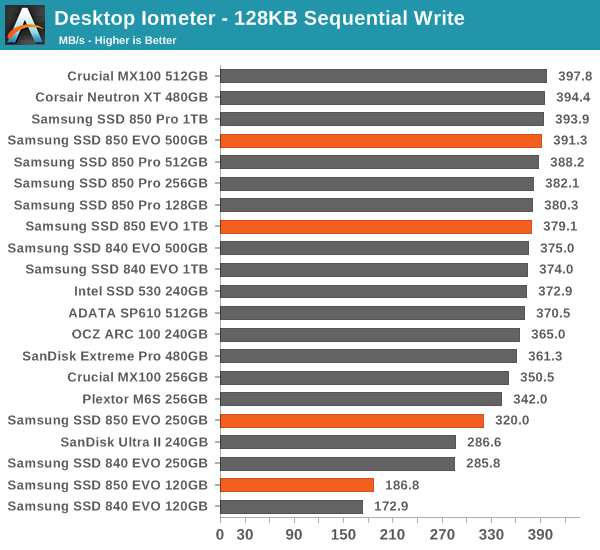
AS-SSD Incompressible Sequential Read/Write Performance
The AS-SSD sequential benchmark uses incompressible data for all of its transfers. The result is a pretty big reduction in sequential write speed on SandForce based controllers, but most other controllers are unaffected.
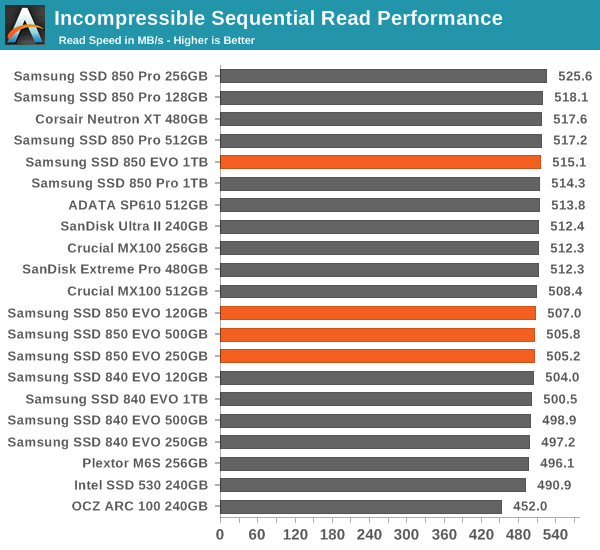
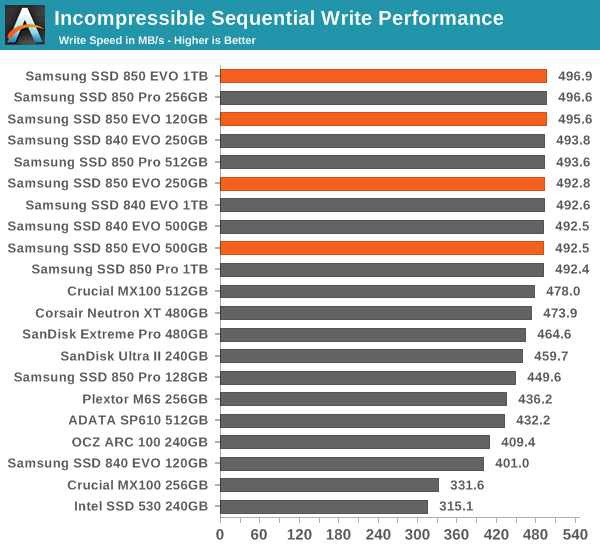










97 Comments
View All Comments
Kristian Vättö - Thursday, December 11, 2014 - link
Hi Simon,Sorry for taking a while to respond -- I had to focus on my finals after I got the review done, so I couldn't catch up with all the comments until now.
The 850 EVO is still a SATA 6Gbps design, so there won't be a SATA Express version of it. There may (and likely will) be an M.2 version coming, although that would also be limited to SATA 6Gbps since M.2 can support both SATA and PCIe interfaces. As for the form factors and capacities, it's impossible to say for sure but technically the 2242 form factor could max out at 512GB and the 2280 at 2TB (assuming double-sided PCB and 16x128Gbit dies per package).
However, the SM951/PM951 will be available sometime next year, although it will be limited to OEM channels again (RamCity saves you, again). That's the PCIe 3.0 x4 NVMe M.2 drive with 3D NAND (SM=MLC, PM=TLC). I don't have any further details at this point, unfortunately.
Regarding other PCIe SSDs, I should know more after CES when I meet with all the companies again and get an update on their schedules, but for now it looks like most designs are aiming at mid-2015 launch.
akula2 - Wednesday, December 10, 2014 - link
850 Pros are my last Samsung SSD products to buy. For the upcoming X99 extreme workstations, I'll to go with:1) SanDisk Extreme Pro 960GB (today $490 vs $600 of 850 Pro). The performance of both SSDs are comparable.
2) Mushkin Scorpion Deluxe 960GB PCI-E SSD: this one decimates all the best SSDs.
3) Intel SSD DC P3700 800GB and 1.6TB models: The King
HisDivineOrder - Wednesday, December 10, 2014 - link
This is the problem with Samsung. When they first came into the market, they blew the competition away with incredible performance, reliability, and pricing.The 840 came with TLC, promising superior pricing with good performance, but in fact pricing was out of whack, putting it way above the 830 that had just left the market. Then 840 Pro took over the high end where only fools dare to tread.
The 850 line (Pro and EVO) raise the prices even higher. It's like Samsung thinks they're the Apple of SSD's and can do whatever they want in pricing. To hell with the competition, people will pay whatever they say.
It's a shame. Way back, I got an 830 because it was a great value. This time around? I waited until Black Friday and picked up a Sandisk after waiting a couple of years for Samsung to remove their head from out of their butt. My 480GB Extreme Pro only cost me $185 and it will last me a good long while.
That could have been you, Samsung. I didn't want to put another brand SSD in my machine. I wanted to have only one Samsung Magician. But Samsung pricing is completely absurd.
So, eh, bye bye, Samsung.
Supercell99 - Sunday, December 14, 2014 - link
They acting like Intel with does Xeon chips, except, Samsung actually has other competition with SSD's. Like you, with my next SSD purchase, I will have to look at other companies as Samsung's $/GB vs the competition has continued to get worse.philipma1957 - Thursday, December 11, 2014 - link
I would like a 1.2th ssd that is really 1.5tb with extra provisioning.I would like it to have good 4k random read writes more then anything.
I have 2 1tb ssds and use them for mac minis.
I use external thunderbolt drives and boot with the 1 tb ssd's the drive in the mini is merely a back up for me. I find I could use a little bigger then 1tb for the video recording I do. Still waiting for a bigger ssd.
harrynsally - Saturday, December 27, 2014 - link
Didn't take long for the MSRP to drop. Was on sale at Newegg and I just bought a 250GB 850 EVO for $114 shipped.Although I previously, purchased two Crucial 256GB MX100s, to use in a couple of older laptops, which installed and continue to run flawlessly, wanted to upgrade the HDD in a new laptop.
Was really conflicted in not buying another MX100, but the better performance specification and 5 year warranty won out.
rvb - Monday, January 19, 2015 - link
Has anyone seen info for the write-block and erase-block sizes for the 1TB 850 Pro? I am intending to RAID 4 of them together, and I want to make sure that my RAID's stride-size is a multiple of the larger of those two values. If they are both something small like 4KiB, then pretty much any larger Pow2 value I choose will be fine. But my only other SSD purchase (OCZ Vertex 4) had a WBS of 8KiB and an EBS of 2MiB. In that case, if I'm going to be writing large files to my RAID, then I think it's useful to know that the EBS is so large, so that I can set my RAID stride-size accordingly.Samsung's "data sheet" for the 850 Pro series neglects to give this information... however, I do note that they only quote random-write performance in terms of 4KB transfers, which may imply that at least their WBS is 4KiB. I just wish I knew for certain, and also the EBS ?
mirkogutic - Saturday, January 24, 2015 - link
Hi, i own 2 of the 120GB Samsung EVO 850.Should I put them in RAID 0 or leave them as separate drives?
It seems that Samsung Magician works only when drives are not in RAID mode.
Also, RAPID mode works only on one drive and when not in RAID.
Nilth - Thursday, April 16, 2015 - link
Sorry for the probably dumb question, but isn't the way turbowrite works detrimental for the ssd longevity? If I understood correctly, (almost) ALL the writes are going to pass through the same "x" GB slc buffer. Isn't that partition going to "wear out" son enough?djdownfawl - Thursday, June 4, 2015 - link
@Kristian VättöAs of today's prices Samsung 850 EVO vs the PRO. Would you recommend buying the EVO or the PRO?